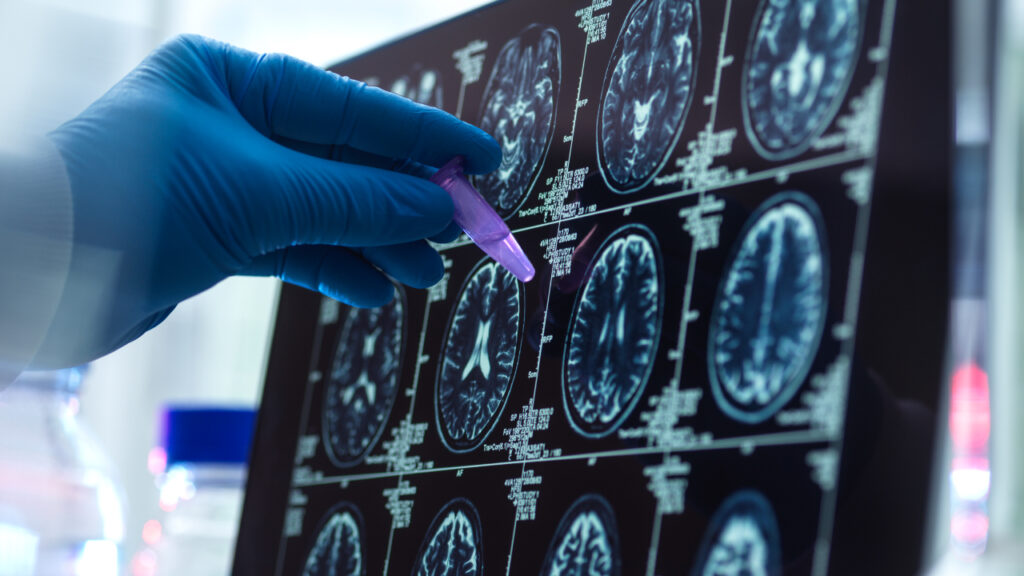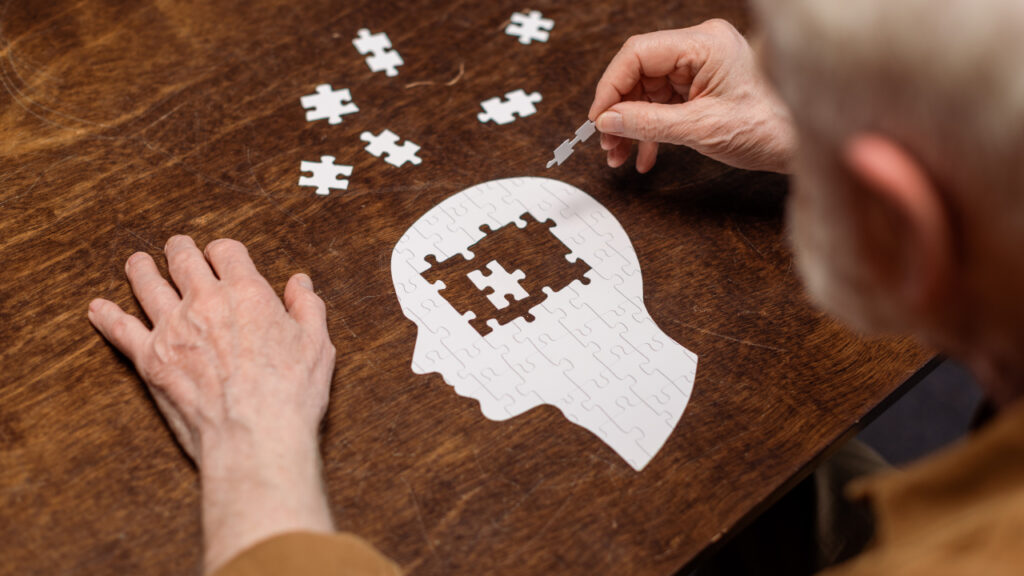Did you know that more than 200,000 people suffer from dementia in Portugal?
To talk about dementia is to talk about a difficult journey, both for those who live with the disease and for those who care for them. Little by little, memory begins to fail, behavior changes and everyday life is no longer the same. It’s hard, confusing and sometimes even unfair.
But knowing what to expect can make all the difference. Because even when everything seems to be falling apart, there are ways of caring with more calm, more presence and less fear.
Key points of the article
- Dementia is a set of symptoms that affects memory, reasoning and behavior and worsens over time
- There are several types of dementia, the most common of which are: Alzheimer’s, vascular dementia, dementia with Lewy bodies and frontotemporal dementia
- Each type of dementia has different manifestations, but they generally evolve through three stages: early, moderate and advanced
- Identifying the first signs and knowing the stages helps to better prepare support for people with dementia
- Early diagnosis, cognitive stimuli and a supportive environment can slow down the progression of the disease
- Supporting someone with dementia requires constant adaptation, empathy and often specialized support.
What is dementia?
Dementia is not a specific disease, but a term used to describe a set of symptoms that affect the brain. We’re talking about progressive memory loss, difficulty thinking, communicating, making decisions or even recognizing familiar faces and places. These symptoms interfere with the person’s autonomy and gradually make everyday life more challenging.
In Portugal, it is estimated that dementia cases could double by 2080, exceeding 450,000 cases (almost 5% of the population) according to a study by CIDIFAD. This increase is directly linked to the ageing of the population, making it even more urgent to focus on prevention, early diagnosis and support for families.
Against this backdrop, it’s important to learn more about the disease and understand how it manifests itself. There are various types of dementia, but they all have one thing in common: they are progressive diseases. This means that the symptoms begin mildly and worsen over time.
What are the first signs of dementia?
The first signs of dementia can be subtle – so subtle that they are often mistaken for “things of age” or simple tiredness. But there are behaviors and forgetfulness that, when they become frequent, deserve attention.
Some of the most common signs include:
- Recent forgetfulness, such as repeating questions or forgetting where you put objects
- Difficulty finding words or following a conversation
- Disorientation in time and space, even in familiar places
- Changes in mood or behavior, such as irritability, apathy or unjustified distrust
- Less ability to plan or make simple decisions, such as preparing a meal or paying bills.
These signs do not in themselves mean that dementia is involved, but they are an important warning to seek medical evaluation. The sooner the diagnosis is made, the sooner action can be taken to slow down the progression and ensure a better quality of life.
For more information and support, you can consult Alzheimer Portugal, one of the main national references in the field.
The four most common types of dementia
Not all dementias are the same. While some begin with seemingly harmless forgetfulness, others are manifested by personality changes or episodes of hallucination.
Knowing the different types of dementia is an important step towards a better understanding of what is happening to the person living with the disease… and even to avoid hasty judgments.
Alzheimer's disease
It is the most common form of dementia. It mainly affects memory and often begins with seemingly harmless forgetfulness. Over time, it compromises language, reasoning and the ability to recognize people or places.
Vascular dementia
Caused by circulation problems in the brain, such as strokes. The symptoms depend on the area affected and the progression can be “jumpy”, meaning that the person can suddenly get worse after a new vascular episode.
How long you live with vascular dementia depends on the severity of previous strokes, comorbidities and how quickly cognitive decline sets in. On average, after diagnosis, life expectancy can vary between 5 and 10 years, but with large variations between people.
Dementia with Lewy bodies
It is characterized by fluctuations in attention, visual hallucinations, tremors and muscle rigidity. It can be confused with
Frontotemporal dementia
It affects the frontal and temporal regions of the brain, which means that the first signs are not always linked to memory. Instead, the earliest signs are changes in behavior, impulsiveness, difficulty communicating or even loss of empathy.
This was the type of dementia that actor Bruce Willis was diagnosed with, a case that brought greater visibility to the disease and showed the world the real impact it can have, even on people who are still relatively young.

Initial phase (mild)
At this stage, the signs can go unnoticed or be mistaken for natural aging. The person remains relatively autonomous, but subtle changes begin to be noticed.
Which is common at this stage:
- Frequent forgetfulness, especially of recent events
- Difficulty finding the right words or following a conversation
- Disorientation in unfamiliar places
- Mood swings or apathy
- Loss of initiative or interest in hobbies
- Small mistakes when handling money or simple household tasks.
Intermediate phase (moderate)
Here, the symptoms become more evident and begin to interfere with daily life. The person begins to need help with basic tasks and the loss of autonomy is more noticeable.
At this stage, they may appear:
- Constant forgetfulness, even of important events
- Disorientation in time and space
- Difficulty getting dressed or preparing meals
- Confusion with faces of family or friends
- Behavioral changes (aggression, distrust, repetition of words)
- Language and comprehension problems
- Onset of urinary incontinence.
Advanced stage (severe)
This is the most difficult and painful phase. The person loses most of their cognitive and physical abilities. They become totally dependent for all basic activities and may not recognize anyone around them.
It’s common to find:
- Inability to communicate or understand language
- Immobility, with loss of coordination and balance
- Difficulty swallowing or eating
- Total incontinence
- No recognition of family members
- Agitation, restlessness or extreme apathy
- Increased risk of infections, such as pneumonia.
At this stage, the focus shifts to comfort:
- Palliative care and pain management
- Simple sensory stimuli (such as touch, music or smell)
- Preserving dignity and emotional well-being.
It’s important to remember that these phases are just a general guideline. Not all people with dementia experience the disease in the same way – symptoms can appear at different times, vary in intensity or even in order.
Each type of dementia has its own pace and form of evolution. Here’s how these phases manifest themselves in the main types of dementia.
Stages of Alzheimer's (the most common dementia)
- Early stage: loss of recent memory, disorientation in time, difficulty finding words
- Intermediate stage: greater confusion, difficulty recognizing people close to you, changes in behavior (irritability, distrust), difficulty performing everyday tasks
- Advanced stage: long-term memory loss, motor difficulties, loss of speech, total need for care.
It usually develops slowly and progressively, with a silent onset.
Stages of vascular dementia
- Initial phase: symptoms vary according to the areas of the brain affected (may appear suddenly after a stroke)
- Intermediate stage: difficulty concentrating, planning and logical thinking
- Advanced stage: progression in “steps” – stable periods followed by abrupt declines; eventual total dependence.
More irregular evolution, with sudden fluctuations and aggravations.
Stages of dementia with Lewy bodies
- Initial phase: fluctuations in lucidity, vivid visual hallucinations, sleep problems (such as REM sleep behavior disorder)
- Intermediate stage: muscle rigidity, Parkinson’s-like tremors, mental confusion
- Advanced stage: severe cognitive decline, worsening motor symptoms and risk of falls.
Early hallucinations and marked fluctuations are hallmarks.
Frontotemporal dementia phases
- Initial phase: personality changes, impulsiveness, disinhibition, impoverished or repetitive language
- Intermediate stage: loss of empathy, compulsive behavior, increasing difficulty in communicating
- Terminal phase: mutism, physical rigidity, need for constant care.
It primarily affects behavior and language, and not so much memory.
What can help slow down the progression?
Although dementia has no cure, it doesn’t mean that nothing can be done about it. There are small choices in everyday life that can make a big difference, help maintain abilities for longer and make the journey lighter, both for those living with the disease and for caregivers.
- Stimulating the brain (reading, music, simple games)
- Do light, regular exercise
- Eat a healthy and balanced diet
- Sleep well and avoid stress
- Maintain social interaction whenever possible
- Controlling other diseases (such as diabetes or hypertension)
- Watch out for signs of delirium, infections or falls.
How to support someone with dementia at every stage
Living with or caring for someone with dementia is a demanding journey, with moments of frustration, but also of deep connection. As the disease progresses, the person’s needs change – and it’s important to adapt the way you communicate, care for and are present.
Here are some practical guidelines for each stage:
Initial phase: supporting autonomy
- Stimulate memory and reasoning with games, conversation and simple tasks.
- Promote structured routines, such as fixed times for meals and medication
- Encouraging autonomy, even if the person needs more time to do certain tasks
- Speak calmly and clearly, respecting the response time
- Helping with the acceptance of the diagnosis, listening without judgment and offering reassurance.
Intermediate phase: protect and adapt
- Reducing hazards in the home, such as loose carpets, plugged-in stoves or dangerous objects
- Use visual reminders: labels on cupboards, calendars with pictures, photographs with names
- Supporting hygiene and nutrition, always respecting the dignity of the person
- Stimulate socialization and emotional memories, even if some memories have already been lost.
Advanced stage (severe): caring with presence and affection
- Ensure physical and emotional comfort: soft clothing, a calm environment, soft music
- Talk to the person, even if they don’t respond – affectionate presence still makes a difference
- Pay attention to non-verbal signals: a gesture of discomfort or a facial expression can indicate pain, cold or hunger
- Seek specialized support, such as palliative care or caregiver support teams.
Dementia is a condition that profoundly affects the lives of those who live it and those who care for them. Each stage brings challenges, yes, but it can also bring new forms of connection, presence and care. There is no magic formula or the same path for everyone, but there is always something that can be done: listening, adapting, welcoming.
If someone close to you is going through this, know that you are not alone. Supporting someone with dementia takes time, patience… and often specialized support.
Ambula is here for that. With a comfortable and humane non-emergency patient transportation service, it helps many families every day to take their loved ones to appointments, treatments or exams, with all the safety and care they deserve. Because in these stages of life, every gesture of support counts, and every smooth journey makes a difference.




